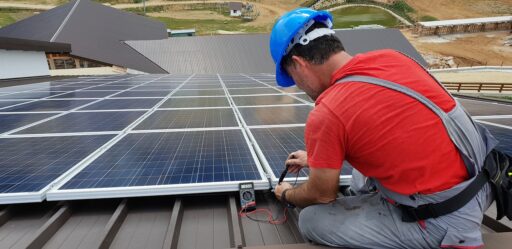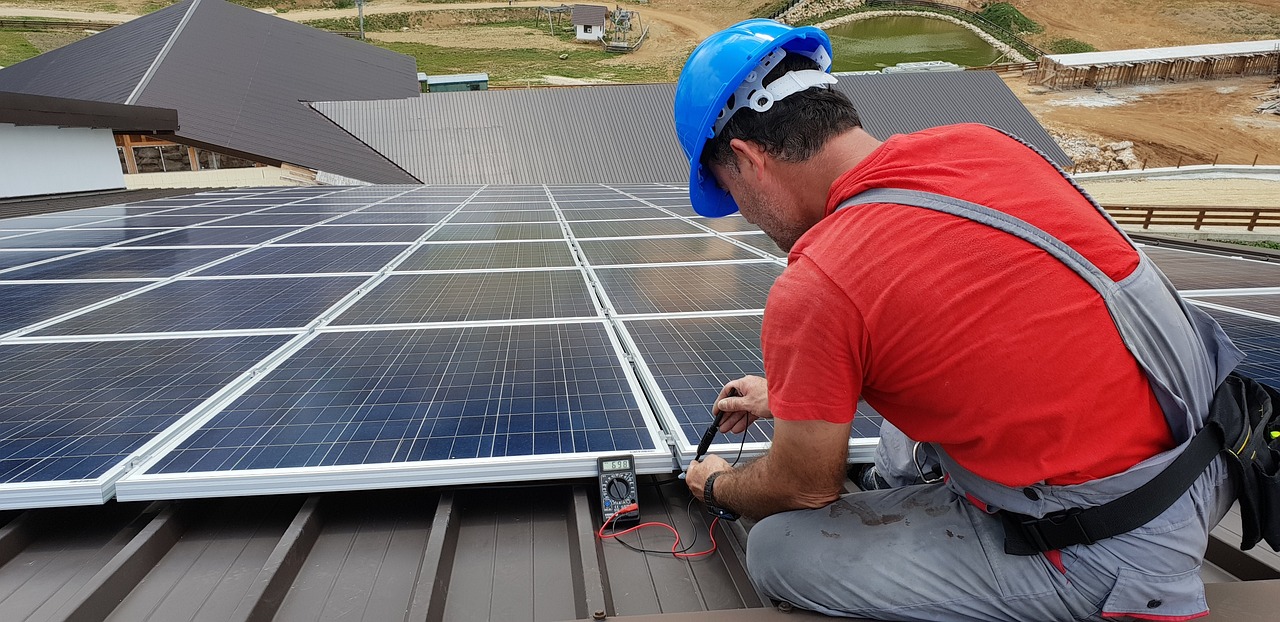How to Choose the Best Solar Installer

Are you considering switching to solar energy for your home or business? If so, then you’re taking a step toward a more sustainable and cost-effective future.
But, choosing the right solar installer can be a daunting task, especially if you don’t know what to look for. That’s why we’ve put together this guide on how to choose the best solar installer for your needs.
From experience and expertise to after-sales support, we’ll cover all the essential factors to help you make an informed decision about going solar.
So let’s get started!
Experience and Expertise
An experienced installer has likely worked on many projects. This means they have encountered a wide range of challenges and know how to handle them. An expert solar installer will also know about the latest industry trends and technologies.
They can advise you on the best equipment for your specific needs. Plus, they can provide a guide on optimal system design and energy efficiency. Make sure to ask potential installers about their experience level project:
- size
- complexity
- location
You want an installer who has proven success with installations similar to yours.
Reputation and Reviews
A good reputation is built over time by delivering high-quality services to customers. You can research reputations and reviews through online platforms such as:
- Yelp
- Google Reviews
- social media
Review what past clients have said about their experience with the solar installer you’re considering. Positive feedback is a great sign that they deliver quality workmanship. It means that they have excellent customer service.
But, negative feedback should be taken seriously. This is because it can indicate potential issues in installation or after-sales support.
Don’t just rely on online reviews alone, though. Seek references from people you know who have gone through the process of installing solar panels themselves.
Licenses and Credentials
These credentials indicate their expertise in installing solar panels safely and efficiently. A reputable solar installer should have all the licenses required by their state or local authorities.
Each state has different regulations. So be sure to research what specific licenses your desired installer should hold.
Remember always to ask for proof of credentials when selecting an installer. Knowing you’re working with qualified professionals who take pride in their work will give you peace of mind.
Quality of Equipment
High-quality equipment will ensure that your solar system operates efficiently and effectively for years. One key aspect of equipment quality is the durability and longevity of the materials used.
Solar Panels
Solar panels should be made with high-grade silicon cells and tempered glass. These materials can withstand harsh weather conditions.
Inverters
Inverters are critical in converting DC power from your panels into AC power for use in your home or business. Make sure your installer uses top-of-the-line inverters that are reliable and efficient.
Batteries
Batteries are also an essential consideration if you plan on storing excess energy generated by your system. Quality batteries can last up to 20 years or more, so invest in ones with a proven track record of reliability.
Monitoring Systems
Monitoring systems can provide valuable insights into how well your solar system performs over time. Look for installers who offer advanced monitoring technology as part of their package.
Customization and Design
Every home or business has unique requirements that need a tailored approach. Your solar installer should be able to assess your energy needs and design a system that caters to them.
A well-designed solar system will not only meet your energy needs. It can also complement the aesthetic appeal of your property. A reputable solar installer will work with you in creating a customized plan. They will ensure this plan meets all your expectations while staying within budget.
Customization also involves choosing the right panels for your specific location and environment. For instance, if you live in an area with frequent storms or high winds, you’ll need panels designed to withstand such conditions.
Additionally, customization allows for flexibility regarding future expansion or upgrades. With the right design, you can add more panels as needed without compromising on efficiency.
Site Assessment
Site assessment is an important step that helps the installer understand your energy needs and determine the best location for panels. The first thing the installer will look at during a site assessment is your roof or property layout.
One of the important things they’ll check is the type of roof you have. Some roofing materials, such as slate and tile, are unsuitable for solar panel installation. However, if you want to learn more about the ideal roofing materials for solar installation, you may check out reliable websites or click here for more information.
In addition to the type of roof, they will also need to determine if there are any obstructions. This includes trees or buildings that may interfere with sunlight reaching the panels. The orientation of your roof and any shading concerns will also be evaluated. For example, it’s essential to consider the slope of your roof. Solar panels are ideally installed on roofs with a slope of at least 15 degrees. The size of your roof should also be considered, as the number of solar panels you need may depend on your roof size and energy needs.
They will need to determine if there are any obstructions. This includes trees or buildings that may interfere with sunlight reaching the panels. The orientation of your roof and any shading concerns will also be evaluated.
Next, they’ll consider how much electricity you use daily to design a system tailored to your home’s unique energy needs. They’ll also want to assess other factors like weather patterns in your area and available incentives or rebates that can help offset costs.
Once all these factors have been considered, the installer will provide you with panel placement and size recommendations. This will be based on their findings from this initial evaluation process.
It’s important to note that not all homes are ideal candidates for solar installations. This could be due to various reasons, including shade coverage or cost constraints. So you must work with an experienced professional with expertise in this field!
Financing Options
While installing a solar system can be expensive upfront, it’s important to remember that this investment pays off in the long run. That being said, financing options are available to make the process more affordable.
Many reputable solar installers offer financing options such as loans or leases. They can allow you to spread out payments over time.
This means you don’t have to pay for everything upfront. Plus, you can start reaping the benefits of your new solar system right away.
When considering financing options, looking at interest rates and payment plans is essential. Some companies may offer low-interest rates. However, they may require larger down payments or shorter repayment terms than others.
Additionally, it’s essential to consider some other factors when looking for financing options. These include repayment terms, prepayment penalties, and even solar incentives. Make sure to talk to your prospective solar installer about their financing solutions and how they can help you get the best deal.
Warranty and Maintenance
A good warranty will protect you from unexpected repair costs or equipment failures. Before choosing a solar installer, make sure that they offer a comprehensive warranty that covers all aspects of the system. Typically, solar installers offer two types of warranties:
- Product Warranty: This warranty covers the solar panels and other equipment against defects in materials and workmanship. The length of the product warranty varies, but it is typically 10-25 years.
- Installation Warranty: This warranty covers the labor and materials used to install the solar system. The length of the installation warranty is typically 5-10 years.
In addition to the warranty, pay attention to the maintenance services offered by your installer. These services include cleaning the solar panels to remove dirt and debris, inspecting the solar system for damage or defects, and repairing any problems that are found. Remember, regular maintenance can help ensure that your solar panels are operating efficiently and effectively. This can save you money on energy bills in the long run.
Ask potential installers about their post-installation support. Will they perform routine inspections? What happens if something goes wrong with the system?
Knowing what kind of support you can expect after installation will give you peace of mind knowing your investment is protected.
Insurance Coverage
Solar panels are installed on rooftops and can pose risks such as damage to the roof or potential injury to workers during installation. It’s vital to ensure that your chosen installer has liability and worker’s compensation insurance.
Liability insurance covers any property damage or injury caused by the installation process. Worker’s compensation provides coverage if someone is injured while working on your property.
Make sure you ask for proof of insurance before hiring an installer. This is because it will protect you from any potential legal liabilities should something go wrong during the installation process.
Local Knowledge
Local installers understand the unique challenges of installing solar panels in your area. They know the following:
- weather patterns
- building codes
- zoning laws
All of which can impact your installation. Local knowledge also means they have connections to suppliers and other professionals in the industry. This can help streamline the process and ensure you get quality equipment at competitive pricing.
In addition, local installers are often more invested in their community and take pride in providing excellent customer service. They may even be able to provide references from satisfied customers in your neighborhood.
Competitive Pricing
With so many companies in the market, shopping around and comparing prices is vital to get the best deal. But be wary of installers who offer prices that seem too good to be true.
Low prices may indicate poor-quality equipment or inexperienced installers. This could cost you more money in the long run. It’s worth noting that not all solar panels are created equal.
Some materials and brands will naturally cost more than others. But, reputable installers should still offer competitive pricing on high-quality equipment and installation services. Look for hidden costs or fees that might inflate your final bill beyond what was quoted.
Transparency and Communication
A reputable solar company should be transparent in its operations. They must communicate effectively with their clients throughout the installation process.
Transparency starts with providing clear information about:
- pricing
- equipment options
- warranties
- maintenance services
A good solar installer should provide a detailed breakdown of the costs of installing solar panels on your property. This includes the price of:
- equipment
- labor fees
- permits
- taxes
- other charges
Effective communication is also crucial in ensuring that you understand how your system works. It means that you know what you can expect from it. Your solar installer should explain how energy production is measured and how long it will take to recoup your investment in savings on electricity bills.
Training and Certifications of Installers
Installing a solar system is not an easy task, and only trained professionals should do it. Certifications ensure that the installers have gone through rigorous training programs and passed exams on:
- safety standards
- installation procedures
- electrical engineering concepts
- other related topics
Not all solar installers are certified. Therefore, it’s essential to ask them about their certifications. Training is vital as certification since different manufacturers provide various types of equipment for installations.
The installer must know how each component works together in a complete system. The more experienced an installer is with handling diverse materials and technology solutions, means they will be better equipped when installing your specific project.
Therefore, ask potential solar installers about their training program and work experience. Do this before engaging them for your project.
Trained workers will give you peace of mind knowing that no corners were cut during installation. This could be because they know what it takes to deliver quality services safely.
Monitoring and Performance Tracking
Ongoing monitoring and performance tracking services help identify any potential issues early on. This can ensure timely repairs or maintenance work. Monitoring systems can range from essential remote monitoring tools to advanced software solutions that provide real-time data analysis.
Some systems may also include alerts for system malfunctions or underperformance. Performance tracking involves measuring the actual energy production of the solar panels against expected outputs. This is based on weather patterns and other variables.
It’s essential to choose a company that offers comprehensive performance-tracking services. This is because they can provide valuable insights into the efficiency of your solar panel system.
After-Sales Support
After-sale support from an installer involves:
- clear communication
- quick response time
- free advice on repairs/maintenance
- availability of spare parts
Customers should also check customer reviews. That way, it will be easy to understand the quality of an installer’s after-sale support. This can help make an informed decision about who to hire.
Researching reviews online, asking friends and family for references, and consulting with solar experts can all help identify the right installer with good after-sale support that can assist over the long term. An excellent place to start looking into a company is through this helpful blog.
Choose the Best Solar Installer
Choosing the best solar panel installation company can be a daunting task. You can pick the best fit for your home and solar needs by researching different installers, their qualifications, and customer reviews.
Ultimately, the best installer will be the one that meets your expectations and provides reliable, quality service. Now that you know how to choose the best solar installer, why not take the next step and find one today for your home?
If you want to explore more helpful articles like this, visit our blog.








